Do you get headache after eating : its treatment and why it happens
Understanding Headaches After Eating: Causes, Treatment, and Prevention:
Knowing Post-Eating Headaches: Beginnings, Management, and Avoidance A frequent condition that many people suffer at various times in their lives is headaches. On the other hand, headaches that come on especially after eating can be very annoying and may indicate underlying medical problems. Known as a “postprandial headache,” this type of headache can many have different causes and we discuss about its treatment also. Maintaining general health requires knowing the cause of headache. How to treat them and how to avoid. In this blog we will speak about remedies and preventive measures for headache that happen after eating
1.Knowing the Reasons Behind Postprandial Headaches:
There are numerous things that might cause postprandial headaches, from food preferences to underlying medical issues. For management and prevention to be effective, understanding the underlying cause is essential. These are a few typical reasons:
Changes in Blood Sugar Levels:
A sudden change in blood sugar levels after eating is one of the most common reason of headaches. When you eat a full of meal loaded with sugar or carbs this can sudden rise of high blood sugar in your body and sudden decrease of blood sugar which cause you headache after eating . A sudden change blood sugar may cause a headache, which is frequently accompanied by other symptoms like exhaustion, irritation, and dizziness.
Hypoglycemia:
Here we talk about another condition like hypoglycemia and Low blood sugar, or that can cause you headaches after eating food. In this condition when you eat food, after eating, your blood sugar decreases too rapidly, that glucose didn’t reach to your brain, which might cause a headache
2.Food Allergies and Sensitivities: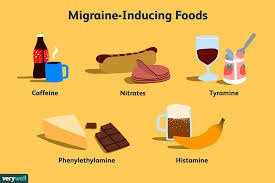
People who have allergies to some kind of food, and if they eat allergic food they experience headache who are sensitive to certain meals. Like some common allergies people experience in these foods For example Dairy products, gluten, artificial sweeteners (like aspartame), and food additives like monosodium glutamate (MSG) are the main reason of headache. These meals can produce an allergic or immune disorders reaction in the body, which can result in headaches
You know that histamine intolerance is a problem in which your body in unable to digest or properly digest your food. Histamine is present in many foods like old cheese, fermented food , wine etc. you can get more information about this histamine you should find from google or consult with doctor. This can cause you headache, because of high histamine in that food which you consume
3.Lack of water:
Dehydration is also the cause of your headache. If you don’t drink enough water in your day or water before meal and during meal you can experience headache. This happen when you get dehydration and your blood supply to your brain decrease that’s why you get headache after eating
4.Coffee Abstinence:
In the event that you are a habitual caffeine user and you finish the addiction of caffeine , headaches might be an indication of removal of caffeine. Even if you only eat or drink little amounts of caffeine, this can still happen, which could lead to headache after eating
5. Tyramine and Other Food Compounds:
Tyramine is naturally found in some foods like old cheeses, old meats, and fermented goods. Some people who are already suffering from migraine when they eat tyramine food they get headache. You know why headache happen, Tyramine can shrink your blood vessels and again expand your blood vessels. which can cause you headache In addition, certain substances might cause headaches in vulnerable people, such as nitrates (found in processed meats) and sulfites (found in wine and dried fruits).
6. Digestive Problems:
Headaches that occur after eating can occasionally be linked to digestive problems such as celiac disease, GERD, and irritable bowel syndrome (IBS). The inflammatory reaction of the body or the strain that intestinal discomfort can put on the body could be the cause of this headache.
7.Jaw and Dental Issues:
Headache may be arise from dental issue. When you bite the food incorrectly or you have jaw disorders like temporomandibular TMJ, when you chew a food you get pain or getting difficulty while chewing something, due to that stress you get headache
8.elevated blood pressure:
9.Factors Related to Hormones:
Hormonal shifts can cause headaches in certain people, particularly if they occur right before or right after eating. For instance, some diets or eating habits may make headaches associated with menstruation, pregnancy, or menopause worse for women.
Treatment Options for Headaches After Eating: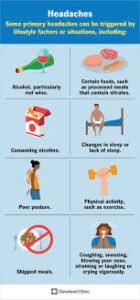
Finding and treating the underlying cause is a key component of post-meal headache therapy. The following techniques could aid in preventing or easing postprandial headaches:
Control Blood Sugar Levels:
it’s important to maintain blood sugar levels stable to avoid headaches produced on by fluctuations in blood sugar. This can be accomplished by:
. You should keep your diet well balanced like your meal should have include fats, protein and carbs.
. If you want to keep your sugar level normalize you should avoid high sugar food, beverages.
. You should take small amount of meal frequently throughout a day to keep blood sugar normalize.
. You should more include in your diet like lean meat , fiber food or drinks , or whole grain to reduce the the rate of sugar level.
Identify and Avoid Trigger Foods:
Try maintaining a food journal to record what you eat and when headaches happen if you think that certain foods are the source of your headaches. After you’ve identified possible trigger foods, cut them out of your diet and observe whether your headaches go better.
. Consulting a healthcare professional or dietitian can assist individuals with food allergies or sensitivities in identifying and avoiding trigger foods.
. To identify particular triggers, think about implementing an elimination diet under the supervision of a medical practitioner.
Maintain Hydration:
A straightforward yet powerful strategy to avoid headaches is to drink enough water. You should take enough water by taking sip of water frequently throughout a day. But if you don’t consume to much water eat that type of fruits and vegetables which is rich of water.
Manage Caffeine Intake:
Try to stick to a constant level of consumption of caffeine rather than decreasing and rising if you suffer from caffeine-related headaches. Headaches are among the withdrawal symptoms that can be reduced by gradually cutting back on coffee use.
Overcome the usage of Drugs or we can say medicine:
OTC pain relievers such as acetaminophen, aspirin, or ibuprofen may be helpful to reduce the regular headaches. But don’t use this painkillers daily as these painkillers can result in returning headaches.
See a doctor if you often get headaches after eating so you can rule out other possible causes and make sure you’re not concealing a more serious underlying illness.
Take Care of Digestive Problems:
Take Care of Digestive Problems Treating the underlying disease can help if your headaches are being caused by stomach problems. As an illustration:
- Dietary adjustments for GERD sufferers, such as avoiding fatty or spicy foods and try not to sleep after eating meals may be beneficial.
- People who are suffering from Celiac disease may follow A stringent gluten-free diet to avoid headaches.
- Dietary changes and probiotics can help control IBS symptoms.
Handle Stress:
A number of issues that create headaches after eating can be caused worse by stress. Headaches can be controlled by and become less painfull when you start the use of stress-reduction practices including yoga, meditation, deep breathing exercises, and regular physical activity.
Take Care of Digestive Problems take advise from with a Medical Expert:
It’s crucial to see a doctor if you frequently or severely get headaches after eating. They can help you create a treatment plan that is customized to meet your individual needs and run testing to rule out any underlying issues.
- Headaches can be lessened for those who have disorders like high blood pressure or TMJ by treating the underlying problem with the right medical care.
- A medical professional may suggest hormone therapy or lifestyle modifications as therapies for hormonal headaches.
Prevention Strategies:
It requires an equal amount of food control, changes to your lifestyle, and an understanding of any possible causes to prevent headaches after eating. Here are a few successful preventative techniques:
Have a Well-Balanced Diet:
Headaches can be avoided by eating a balanced diet that gives you consistent energy and nutrition. This comprises:
- Try to eat food grains which have nutation try to eat many vegetables, lean meats
- You should try to stop or reduce eating food which have excessive amount of sodium, sugar, and additive levels that can cause headaches.
- Eating frequently to prevent extended fasts that may cause blood sugar dips and headaches as a result
Engage in Mindful Eating
In this part we tell you, like you eat food , how you eat food which food you eat you eat food slowly or fast and how your body reacts this is the part of mindful eating. You have to check why you get headache like you get headache due to slow or fast eating or some food which cause you headache. Additionally, by aiding with digestion and portion control, this technique can lessen the chance of experiencing pain after eating.
Moderate Intake of Alcohol:
Red wine in particular is often the cause of headaches If you get headache due to drinking of alcohol after eating food you have to completely stop the consumption of wine after eating. You should reduce the intake of alcohol and try to not drink wine after eating. Try to drink alcohol before 1hour of food and after 1hour of food
Keep an eye on your sodium intake:
An excessive salt diet may cause migraines and elevated blood pressure. Pay attention to how much salt you consume, particularly from packaged and restaurant foods. Using herbs and spices to enhance flavor instead of salt when cooking at home can help you limit your consumption of sodium.
Continue Your Regular Sleep Schedule:
Headaches, especially those that come on after eating, can be more common when sleep quality is poor or when sleep patterns are erratic. To make sure you receive enough sleep, establish a soothing nighttime ritual and strive for a regular sleep pattern.
Take Part in Regular Exercise:
Frequent exercise improves general health and has the potential to lower stress, improve blood sugar regulation, enhance sleep quality, and prevent headaches. But watch when and how hard you exercise; some people have headaches after doing intense physical activity.
Be Aware of Adverse Drug Reactions:
Headaches are a common adverse effect of some drugs, especially when combined with specific meals. If you think that your prescription
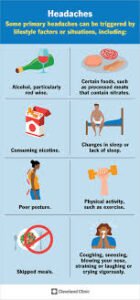
Do you get headache after eating : its treatment and why it happens
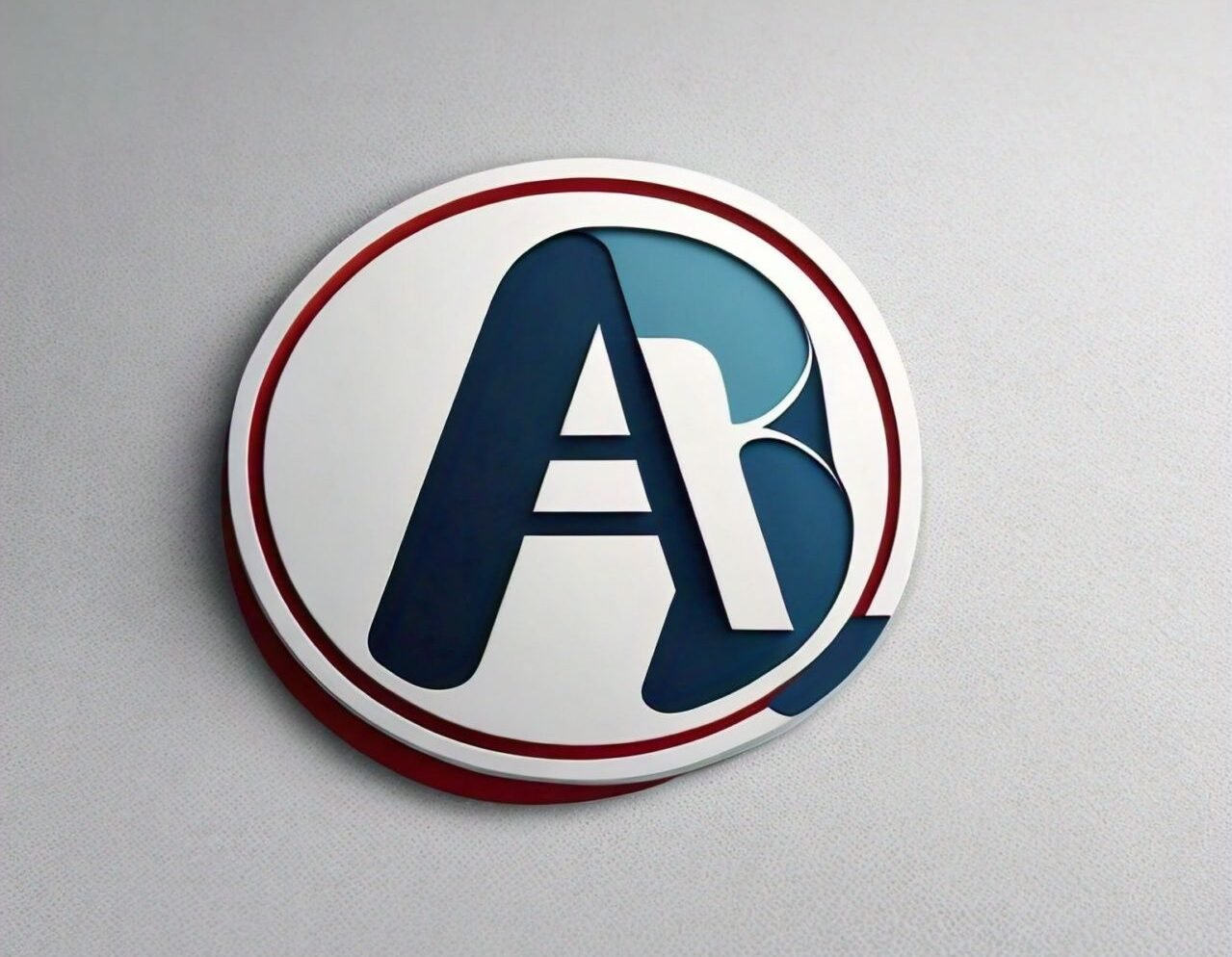
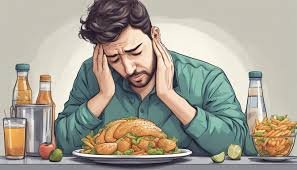
Pingback: brain tumor symptoms in urdu - Ahmed-expert
Стильные советы по созданию стильных луков на любой день.
Обзоры экспертов, события, все новые коллекции и мероприятия.
https://ekbtoday.ru/news/2024-09-10-demna-gvasaliya-pereosmyslyaya-modu/
Pingback: Best Places To Travel In February In USA - Ahmed-expert